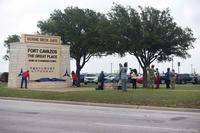Afghanistan's spy agency and some Taliban spokesmen confirmed Sunday that top Taliban leader Mullah Mansour was killed in a U.S. drone strike Saturday in Pakistan that U.S. officials said could mark a new phase in the nearly 15-year-old war.
Secretary of State John Kerry repeatedly referred to Mullah Akhtar Mohammad Mansour (also spelled "Mansur" and "Mansoor") in the past tense while stressing that he had been the main obstacle to peace talks pressed by the U.S. and Afghan President Ashraf Ghani that fell apart earlier this year before they began.
Mansour "was directly opposed to the peace process," Kerry told reporters in Myanmar, formerly Burma, where he stopped enroute to joining President Barack Obama in Vietnam for talks on the rebalance of U.S. forces to the Pacific.
"Peace is what we want," Kerry said. "Mansour was a threat to that effort and to bringing an end to the violence and suffering the people of Afghanistan have endured for so many years now."
Army Brig. Gen. Charles Cleveland, the main spokesman for U.S. Forces-Afghanistan, was more cautious on whether Mansour had been killed in what was reportedly a strike on his car by multiple U.S. unmanned aerial vehicles firing AGM-114 Hellfire missiles.
"We are confident, but at this point we do not have indisputable facts that he is dead," Cleveland told The New York Times.
In previous briefings to the Pentagon, Cleveland said that Mansour, who emerged as the Taliban commander last year following a leadership struggle brought on by the death of Mullah Omar, was the main organizer of the Taliban's poppy and heroin trade that provides the main source of funding for the insurgents.
Shortly after the airstrike in Pakistan's Baluchistan province near the town of Ahmad Wal, Pentagon Press Secretary Peter Cook said Saturday, "Mansour has been the leader of the Taliban and actively involved with planning attacks against facilities in Kabul and across Afghanistan, presenting a threat to Afghan civilians and security forces, our personnel, and coalition partners."
Cook said that Mansour was directly responsible for the deaths of U.S. troops in Afghanistan.
"Since the death of Mullah Omar and Mansour's assumption of leadership, the Taliban have conducted many attacks that have resulted in the death of tens of thousands of Afghan civilians and Afghan security forces as well as numerous U.S. and coalition personnel," he said.
The strike, which appeared to be consistent with the complicated rules of engagement for U.S. forces in Afghanistan, may suggest Army Gen. Joseph Votel, the former commander of U.S. Special Operations Command and now commander of U.S. Central Command, is taking a more aggressive approach since succeeding Army Gen. Lloyd Austin at CentCom.
On the same day that the drones struck in Pakistan, Votel became the first top U.S. commander to go into Syria to gauge first-hand the progress of Syrian rebel forces trained and advised by U.S. Special Forces at a small base in northeastern Syria.
Mansour, who was suspected of having close ties to Pakistan's Inter-Services Intelligence agency, was reportedly returning from a trip to Iran in a rental car when the drones struck, killing him and the driver. Photos obtained by Agence France Presse showed burning wreckage and two bodies inside the car.
The British newspaper Daily Mail reported that the bodies were taken to the Pakistani city of Quetta where autopsies were performed and they were turned over to relatives.
A Taliban spokesman later told Western news outlets that Mansour had survived the strike and an audio recording would be produced to provide proof, but another Taliban spokesman confirmed to the Associated Press that he had been killed.
Afghanistan's spy agency, the National Security Directorate, said that Mansour was dead and Abdullah Abdullah, Afghanistan's chief executive and second in the leadership structure to Ghani, tweeted that Mansour "was killed in a drone strike" near Quetta.
Afghan social media spread reports that Mullah Mansour may have been traveling on a Pakistani passport and also had a visa from Iran when he was killed.
Mansour succeeded Mullah Omar last year after it became public that Omar, the founder of the Taliban, had been dead since 2013, reportedly of natural causes. His succession followed a power struggle for ascendancy in the Taliban in which Mansour reportedly was wounded.
Mansour's death raised the prospect that a more militant leader might take his place. Mansour last year named Sirajuddin Haqqani, son of the founder of the Taliban-allied "Haqqani network," a deputy commander of the Taliban. The U.S. has offered a $5 million reward for the capture or killing of Sirajuddin Haqqani.
In reaction to the strike in Pakistan, even the most consistent critics of the Obama administration's conduct of the wars in Afghanistan, Iraq and Syria praised the action and Obama's authorization of it.
The critics also argued that the success of the strike should influence Obama's coming decision on whether to proceed with the original plan to withdraw more troops from Afghanistan later this year.
Army Gen. John Nicholson, the new commander of U.S. Forces-Afghanistan, was expected to make his recommendations by the end of May on whether to maintain the current level of U.S, troops at about 9,800 or draw down to 5,500 by the end of this year.
'I'm glad to hear we decided to bring the leader of the Afghan Taliban, Mullah Akhtar Mansour, to justice," Sen. Lindsey Graham, a Republican from South Carolina, told CNN. "'I appreciate President Obama for authorizing the attack. And job-well-done to the members of our military and intelligence communities who carried out the mission."
Graham and Sen. John McCain, an Arizona Republican and chairman of the Senate Armed Services Committee, both said that Obama should now keep the U.S. troop presence at current levels in Afghanistan.
"I welcome the news that Mullah Akhtar Mansour has met his just end," McCain said in a statement. "I hope this strike against the Taliban's top leader will lead the administration to reconsider its policy of prohibiting U.S. forces from targeting the Taliban."
Under the current rules of engagement, U.S. forces are limited to a train, advise and anti-terror mission that permits strikes against al-Qaeda in Afghanistan.
The rules were modified earlier this year to allow strikes against the affiliates of the Islamic State of Iraq and Syria, or ISIS, which operate mostly in Afghanistan's southeastern Nangarhar province. However, strikes against the Taliban currently are permitted only in "self-defense" of U.S. and coalition forces.
In commenting on the prospects for peace, Bruce Riedel, a former deputy assistant secretary of defense for the Near East and South Asia, wrote for the Daily Beast that Mansour's death was "a significant but not fatal blow to both the Taliban and their Pakistani Army patrons.
"The critical question Afghans and Pakistanis are asking is whether this is a one-off or the beginning of a more aggressive American approach to fighting the war in Afghanistan," Riedel said.
--Richard Sisk can be reached at Richard.Sisk@Military.com.


























